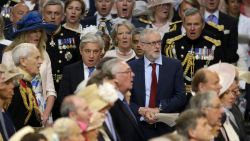Story highlights
Jeremy Corbyn defeats challenger Owen Smith in Labour Party's leadership race
His leftist views win grass-roots support, but Corbyn still alienates party establishment
Jeremy Corbyn has won a decisive victory as leader of Britain’s opposition Labour Party after he fended off a challenge from Owen Smith in a nationwide membership vote.
Corbyn won 61.8% of the votes of more than half a million party members and affiliated supporters. The results were announced Saturday in Liverpool, where the party is gathering for its annual conference.
The left-wing politician garnered 313,209 votes to 193,229 for Smith to win what he called his second mandate as party leader in a year. In doing so, he exceeded his share of the vote last year and tightened his grip on the top of the party.
But even though grass-roots activists gave Corbyn a resounding stamp of approval, Labour’s troubles – including the lowest poll ratings in decades – are far from over as it struggles to convince more centrist voters it can win power.
Corbyn referred to the partisan struggle that has split his party in recent months as he appealed for unity.
“As far as I’m concerned, let’s wipe the slate clean from today and get on with the work we’ve got to do as a party together,” he said.
He also said that “the whole party,” including Labour members of Parliament, had a responsibility to “respect the democratic choice that’s been made.”
“Let us work together for real change in Britain,” he said.
Responding to the result, the governing Conservative Party said: “After months of division and distraction, Jeremy Corbyn has won the Labour leadership election. Again.
“But no one should be celebrating this victory. The policies that Labour are offering will do nothing for people who want a government that will deliver for them.”
From backbench rebel to party leader
The UK’s main opposition party has been plagued by bitter infighting since party members elected the 67-year-old Corbyn as leader following Labour’s defeat in the May 2015 general election.
As a backbencher, the Parliament member for Islington North in London was known for his refusal to follow the party whip and for his left-wing, pro-trade union, anti-Iraq War views.
As leader, he wants to renationalize utility companies and make Britain non-nuclear. He considers the NATO military alliance outdated and aggressive.
These views, the majority of Labour lawmakers believe, make the party unelectable in a general election as Corbyn would be unable to win over centrist voters, especially on defense issues.
Corbyn’s leadership was thrown into doubt in July following mass resignations from the shadow Cabinet and the loss of a confidence vote by 172-40 from the Parliamentary Labour Party.
Another Parliament member, Angela Eagle, first challenged him, but she then stood down for Smith, a little known member of Parliament from Wales.
Brexit fallout
Many Labour Party members in and out of Parliament believe that Corbyn did not campaign hard enough in the June referendum on whether Britain should leave the European Union.
In the past he had been anti-EU but changed tack to support the Remain campaign. The vote to exit the EU caused deep divisions in British society, and Corbyn’s failure to rally Labour supporters around the EU flag left a bitter taste in the mouth of many pro-European Labour lawmakers.
When Corbyn first stood for Labour leader following the party’s defeat in the 2015 elections, he was largely seen as a “fringe” candidate, securing just 35 nominations from fellow Labour Parliament members.
But – just like Sen. Bernie Sanders in the United States – the gray-bearded Corbyn has proved a hit among the party’s grass roots and young people. Many of them joined Labour at the last minute to vote for him, helping him to win the 2015 leadership contest with 59.5% of the vote.
This support led to a massive surge in the party’s membership from a little more than 200,000 in May 2015 to well over 500,000 today, making Labour the biggest political party in Europe. The Labour Party central office was unable to confirm the exact number to date but said it was 640,000 if registered supporters and affiliated members are included.
Diane Abbott, a Labour Parliament member and Corbyn supporter, told CNN: “The young really like Bernie (Sanders) even though he was older than any of the other candidates in the Democratic primaries. Young people are looking for something new. And for them the sort of left politics that Jeremy’s talking about is new.”
Is Labour unelectable?
Despite his popularity with party activists, Corbyn continues to alienate the majority of Labour’s 230 members of Parliament.
They complain of his weak, divisive and dogmatic leadership style and fear his left-wing views will make the party unelectable.
His supporters – which the press has dubbed “Corbynistas” – have formed an extra-parliamentary campaign group called Momentum.
Many political observers have said it is only a matter of time before there’s another challenge to Corbyn’s leadership.
Already a number of members of Parliament have publicly stated they would not serve with him in a shadow Cabinet.
Others, including Corbyn’s predecessor, Ed Miliband, argue that if Labour lawmakers don’t tighten ranks round the leader, the party could face an irreparable split that would project former Prime Minister Tony Blair’s party into the opposition wilderness forever.
CNN’s Simon Cullen and Phil Black contributed to this report.







